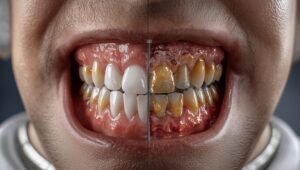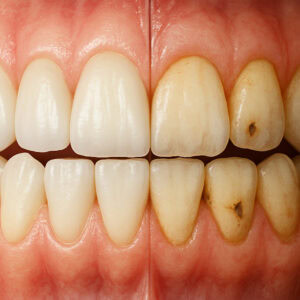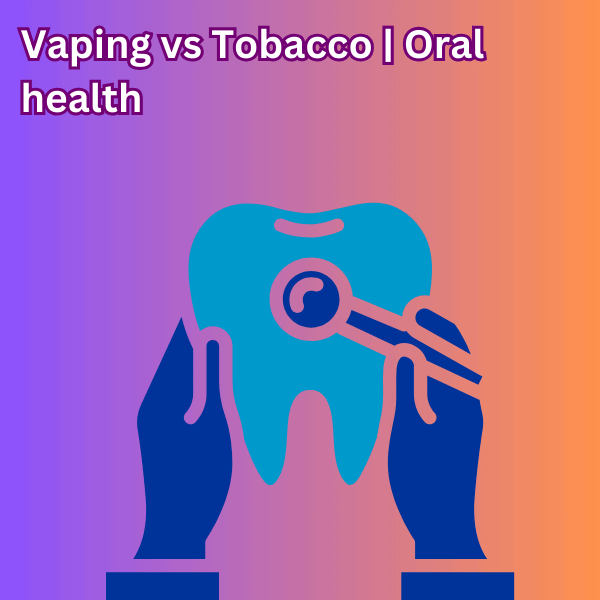Tobacco has long been known as the enemy of oral health, yet what is the result in question to vaping and oral health? Easy to say there must be effects towards it as well, yet to what extent. Staining of teeth, bad breath and unhealthy gums are all topics we will touch on in this blog.
Gums

Tobacco
Reduces blood flow to the gums, starving them of oxygen and nutrients. This leads to gum recession and slower healing after dental procedures. How does this happen ?
- Nicotine tightening the blood vessels including the tiny capillaries in your gums. This limits the amount of oxygen and nutrients that can reach gum tissue.
- Carbon monoxide displaces oxygen: When you smoke, carbon monoxide binds to red blood cells, reducing their ability to carry oxygen. Less oxygen = slower healing and weaker gum tissue.
- Thicker blood, poorer circulation: Smoking increases platelet stickiness and blood viscosity. Your blood is literally thicker and more clot-prone, so circulation to fine tissues like your gums takes a hit.
Vaping
Vaping also causes irritation and restricted blood flow, though typically to a lesser extent than smoking. The nicotine in e-liquids still contributes to gum inflammation and can mask signs of gum disease.
- Dry mouth = bacteria playground. Vaping can reduce saliva production. Saliva is your mouth’s natural defense, without enough, bacteria can build up, increasing the risk of gum disease and cavities.
- Potential chemical exposure. Propylene glycol, flavorings, and other additives may damage gum cells or trigger immune responses. Long-term studies are limited, but early research shows changes in gum cell function and delayed healing.
Along with a few other reasons, they both do damage to your oral health. Tobacco being a lot more like a brick to the face compared to vaping like being thrown with a tennis bowl. Although long term research seems to favor vaping, since its less studied and more complicated.
Teeth

Tobacco
Tar and nicotine stains: The dark compounds in tobacco (tar plus nicotine) stick to enamel, creating yellow-brown or even black stains over time. Stained enamel is easier for bacteria to cling to, so plaque formation accelerates. You know that terrible feeling of fury teeth when one hasn’t brushed in a while. Thats bacteria having a field day on your enamel.
pH imbalance and bacterial shift: Smoking alters your mouth’s pH and encourages “bad” bacteria that thrive in low-oxygen environments. These bacteria produce acids that erode enamel and inflame gums, creating a vicious cycle of decay and periodontal issues. FYI those acids they produce, take a guess where they come from.
Weakened enamel and slower repair: Tar and toxins don’t just stain—they damage the enamel surface, making it more porous and vulnerable. Combined with restricted blood flow, your teeth and gums can’t repair themselves effectively. This point brings it all together from the last topic.
Vaping
No tar, so less surface staining: Without the dark compounds from tobacco smoke, enamel doesn’t get that heavy yellow-brown coating. Your teeth usually look cleaner visually compared to a smoker’s. Although…
Sugary and acidic flavorings: Many e-liquids contain sugars or acids (like citric acid, malic acid, or caramel flavorings). These compounds soften and demineralize enamel over time, making teeth more prone to cavities and sensitivity. Even if your teeth aren’t visibly stained, the surface can be slowly weakening. This is dangerous because most people are highly un-aware of this fact.
Dry mouth risk: Vaping can reduce saliva flow. Saliva is your mouth’s natural defense. It buffers acids and washes away bacteria. Less saliva + acidic e-liquid = enamel erosion and cavity-prone conditions. A dry mouth is never good in any situation, remember that.

As an interesting fact, from the 17th – 19th century physicians would believe that there where worms that would burrow into our teeth causing cavities, decay and tooth aches. So drilling, burning, scrapping and rituals were created to remove them.
Little did they know, they were actually right, the worms where just a little bit smaller than they thought. About 1,000–10,000 times smaller. Called bacteria and their acidic excrement was the cause of our daily tooth issues.
Breath

Tobacco
Smokers are notoriously known for bad breath and hare is why.
Residual smoke compounds: Tobacco smoke contains thousands of chemicals, including nicotine, tar, aldehydes, and sulfur compounds. When you exhale, these compounds linger in your mouth, sticking to enamel, gums, tongue, and the soft tissues inside your cheeks.
Dry mouth amplifies odor: Smoking reduces saliva flow, which normally helps wash away bacteria and neutralize acids. Less saliva = bacteria thrive, producing volatile sulfur compounds that smell like rotten eggs or decay.
Long-term tissue changes: Chronic smoking can lead to gum disease, plaque, and tartar, all of which contribute to persistent bad breath. Even after brushing, smoker’s breath can linger because of chemical absorption in tissues. Your mouth basically becomes the cigarette/tobacco you are smoking.
Vaping
Vaping is flavored and doesn’t carry such heavy compounds like tobacco, so it doesn’t have such a significant effect on the smell of your breath. Although it’s not entirely out of the picture just yet.
Reduced saliva in the mouth leads to no defense against bacteria, which in hand promotes tooth decay and as you could guess that leads to bad breath. A long with other chemicals taking their toll on on your teeth and restricted blood flow to your gums.
What you can do about it

- Brush teeth frequently, especially after smoking if you can. Using fluoride toothpaste and an electric toothbrush ideally.
- Floss as often as you can. Mainly after meals to get rid of anything bacteria can get its grips on.
- Use an antiseptic or alcohol-free mouth wash to kill odor-causing bacteria without drying your mouth.
- Drink plenty of water to keep a good saliva flow, combating bacteria.
- Chew special types of gums (sugar free or xylitol) which will keep a good saliva production going.
- Get regular checkups from the dentist and make sure they clean your teeth when you go.
- Make healthy lifestyle choices, less smoking and less consumption of sugary or acidic products.
- Do antimicrobial rinses and make sure your scrape your tongue off once a day. Thats the real hive of bacteria infestation.
Final say
Oral health is one of the hardest parts of the body to maintain as it is, without the addition of extra help from tobacco and vaping. Brushing your teeth twice a day isn’t even good enough for some people to stay away from tooth decay.
There is always a battle going on inside your mouth and you can think of eating sweets, smoking and drinking unhealthy beverages, as handing the enemy weapons for their effort against winning the war of your mouth.


